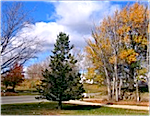Lutheran Religion W

Lutheran Religion W continues with our Online Christian Library under Lutheran orthodoxy with links to the Lutheran books of Edmund Wolf.
Wolf, Edmund Jacob (1840-1905)
Lutheran Religion W
The following is an excerpt from Chapter 1 of the Lutheran book, The Lutherans in America; a Story of Struggle, Progress, Influence, and Marvelous Growth, by Edmund Jacob Wolf 1840-1905. (1889) by Edmund Wolf.
|
Perhaps the boldest utterance ever heard upon this earth was the announcement of Jesus that he would found an imperishable institution. "Upon the rock I will build my Church, and the gates of hell shall not prevail against it." The universal destroyer shall fail to overcome the Church. Everything else under the face of the sun may perish. Thrones and dynasties, nations and kingdoms, systems and creeds, may become extinct. Heaven and earth under this mighty law shall pass away, but the Church of Christ shall never die. Built upon the eternal rock of truth, she is indestructible. The sublimity, the astounding significance of that announcement, must ever challenge the attention of thoughtful minds. Casting defiance at the scepter of death, holding in contempt the teachings of universal history, a Hebrew sage, in an obscure corner of the world, and attended by a few humble peasants, solemnly avows his purpose to read a fabric that will stand forever! The lessons of some thousands of years had pretty well demonstrated the transitory and perishable character of the noblest results of human endeavor. Nations had succeeded nations and made the record of their achievements and their glory, only to disappear again and forever. Colossal empires, splendid civilizations, hoary religions, profound philosophies, vast monuments of art and the loftiest creations of architectural genius, had fallen into decay and crumbled into dust. Of all the mighty past, nothing remained but a few fragmentary records, a few sporadic tenets of philosophy, of religion and of civil government, a few scattered columns on the plains of Mesopotamia, and several huge piles of masonry on the frontier of the Egyptian desert. The earth was one vast graveyard, in which was buried all that a hundred generations had either thought or wrought, with but here and there a broken shaft surviving to mark the spots which entomb the exploits and products of human history. And standing thus amid the shadows and ghosts of this universal sepulchre, (sic) Christ declares his purpose of establishing a Church that shall defy the law of decay and death. |















New! Comments
Have your say about what you just read! Leave me a comment in the box below.